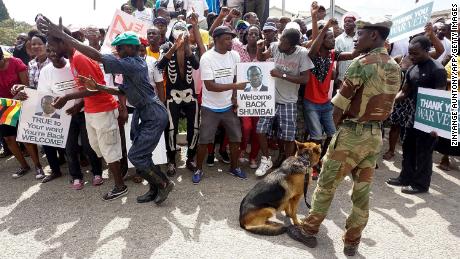Harare, Zimbabwe (CNN)When Emmerson Mnangagwa arrived at the headquarters of Zimbabwe's ruling ZANU-PF party in Harare Wednesday night, the world got its first proper glimpse of the man who will now lead the country.
And his 12-minute speech perhaps gives us an insight into the kind of man he is.
Several things jump out on closer examination.
Zimbabwe as a God-fearing nation
"The voice of the people is the voice of God," Mnangagwa declared. Zimbabwe's new president knows this is a church-going, God-fearing people. He wants Zimbabweans to know he, too, prays. Toward the end of the speech, in Shona, the country's main language, he said: "God who's up above is the one who knows. He is the one who leads his country. He is the one who loves his people."
Forgiveness or revenge?
Despite the appeals to God, there was little in the speech about reconciling with his nemesis -- the "G40 cabal" that he accused of attempting to capture executive authority from a frail and sickly man, 93-year-old Robert Mugabe.
While speaking, he referenced directly a quote from one of former first lady Grace Mugabe's impromptu speeches this year where she attacked him at a rally and accused him of creating division in ZANU-PF and declared "we're going to crush the head of this big snake."
In his speech, Mnangagwa retorted, "so many lies were told. They said 'We're going to crush this big snake's head.' I don't quite know whose head has been crushed now."
The faithful cheered as Mnangagwa's wife, Auxilia, stood by his side fighting back tears.
Also nearby, a dozen or so suited security agents, surrounding him in classic formation. Why? "Sixteen days ago, I received a letter firing me from the government of the Republic of Zimbabwe as vice president," Mnangagwa reminded people. "Within two hours I was informed about plans to eliminate me."
He then went on to remind his audience that he had survived an attempted poisoning on August 12 of this year. He thanked the people of Zimbabwe and ZANU-PF -- as if they are one and the same -- for looking out for him.
He seemed at pains to tell his audience that the threats to his life were real, but he accused no one in particular.
Language matters
When he spoke in Shona, Mnangagwa's message and tone were aimed towards the party faithful. Speaking in English, his message seemed to be targeted at those listening in from the international community. He declared that Zimbabwe is open for business and he's going to bring "jobs, jobs, jobs."
But he is very fond of ZANU-PF and knows its structures well. Speaking in Shona he reminded the faithful that those outside the party can "bark and complain," but the ZANU-PF train is moving forward. "Let them bark while we carry on ruling this country," he declared.
Perhaps he is in no hurry to cooperate with the opposition, but is resolved instead to restore his own party's reputation, and that may be why the army went ahead with "Operation Restore Legacy."
Was he behind the coup?
What was his role in the apparent coup? Until now we weren't so sure, but assumed Mnangagwa was in touch with the military, which he confirmed in speech.
"I was in constant contact with the service chiefs throughout," he said, referring to the security services he originally was in charge of.
The question is, was Mnangagwa the architect of the move? A trained lawyer and former minister of legal and parliamentary affairs, he would have known the importance of the army staying within the confines of the constitution and not straying into coup territory by removing Mugabe without due process. But we may never know for certain what role he played.




